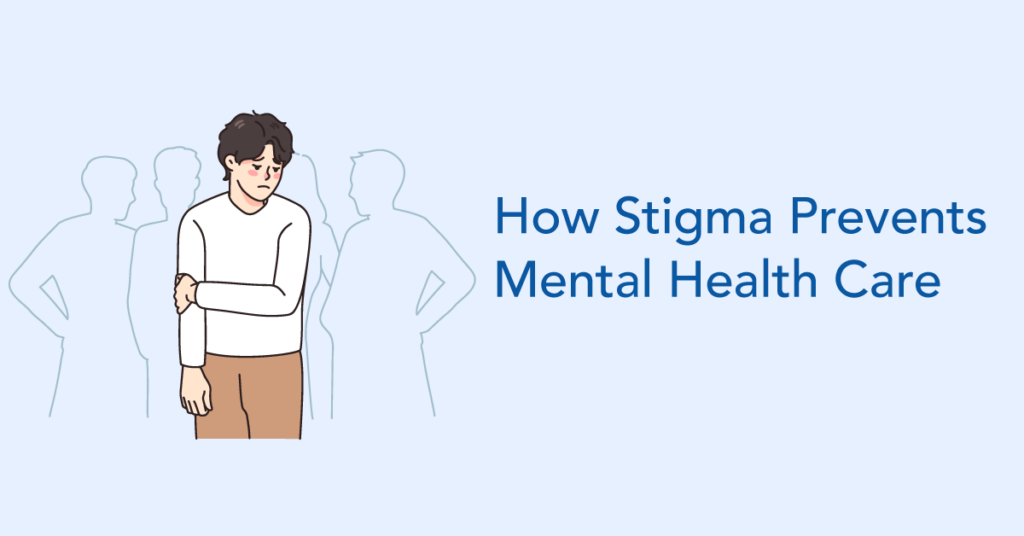Stigma stops people from getting help:
Fear of judgment or discrimination
Cultural shame or misinformation
Education and open dialogue reduce barriers
Struggling with mental health is already difficult. When you’re subjected to harmful stigma about your experiences, it can feel even more burdensome. However, how others perceive your situation isn’t your fault. Raising mental health awareness can help alleviate negative or toxic misconceptions. Let’s explore how stigma presents barriers to mental health treatment and what strategies can facilitate more productive conversations.
The Effect of Stigma on Mental Health Care Access
The stigma definition refers to having a negative view of someone due to a specific personality trait or characteristic. The word is often used toward people with mental health conditions. For example, some people believe that if you’re feeling depressed or anxious, you must be lazy, weak or seeking attention. Hearing your mental health struggle reduced to a personal flaw or failure can be hurtful and discouraging. You may refrain from seeking help or discussing it with loved ones due to fear of rejection or ridicule. Your mental health becomes a dirty secret that weighs on you. And without proper support or treatment, your condition may worsen over time. However, more than 1 in 5 U.S. adults live with a mental illness. If mental health issues are so common, why do they receive such harmful backlash? These misguided comments usually stem from a lack of education or understanding. People who’ve never struggled with their own mental health may not understand the complexities of it. This doesn’t excuse their behavior, but it emphasizes the importance of breaking mental health stigma to enable more positive, productive conversations.How Mental Health Stigma Creates Barriers to Treatment
Stigma has a powerful effect on individuals and communities. Nearly 31% of Americans don’t seek mental health care because they’re worried others might judge them. Some people even lie to their friends and family to avoid admitting they’re in treatment. This hostility and secrecy surrounding mental health care can erect barriers deterring you from seeking treatment, even if it would make you feel better. These barriers include:- Fear of discrimination or harassment. Stigma can create fear of being judged or discriminated against for seeking help. You may worry how it will affect your societal standing, especially among coworkers and employers.
- Impact on relationships or social status. If you’ve heard friends or family members make negative comments about mental health, fears of ruining those relationships may overpower your desire for help. You may worry about losing your social status or being shunned by loved ones.
- Changes to identity and self-perception. For some people, receiving a mental health diagnosis is life-changing, but not in a good way. Exposure to negative mental health comments may cause you to internalize the stigma, developing concerns about how a diagnosis can affect your identity. You may avoid treatment to prevent being labeled.
- Inadequate health care support. Stigma doesn’t affect only the general public. Some health care providers may hold harmful or uninformed views toward mental health conditions, resulting in dismissive attitudes or poor treatment. You may refrain from being honest with your doctor or seeking further care.
Community Impact of Social Stigma
When embedded in communities, social stigma creates a ripple effect that can cause long-lasting damage. For example, health care facilities invest less funding into mental health research, reducing the availability of educational resources or effective treatment approaches. Without these resources, schools and employers lack the tools needed to support students or workers with mental health conditions. For example, they may treat poor grades or performance as indicators of laziness or disinterest, creating more barriers for individuals who need compassion, understanding and support to reach their potential.Strategies to Raise Mental Health Awareness and Reduce Stigma
Although stigma harms individuals and communities, a brighter, more inclusive future is possible. It starts with how you approach mental health topics and support those struggling around you. Explore these mental health awareness strategies to break the stigma and create a healthier society.Speak Out Against Stigma
Challenging mental health stigma is one of the most effective ways of preventing it. This may not come naturally to you, and that’s okay. Educating yourself and facilitating open conversations with others can make it easier to promote your beliefs. Here are some tips to consider:- Learn about mental health conditions, including their causes, symptoms and treatments.
- Share information you learn with others to foster empathy and understanding.
- Correct misconceptions and myths.
- Share your own or others’ experiences with mental health challenges.
Encourage Respectful Language
The way you talk about mental health can influence how other people view the topic. Avoid using derogatory terms or labels that promote stigmatization. For example, say “a person with depression” rather than “a depressed person.” This wording implies an individual is more than their diagnosis.Support Others Who Are Struggling
Lend a helping hand if someone you know is struggling with their mental health. Listen to their concerns, and validate their feelings and experiences. Offer to help them find resources or treatment options aligning with their needs. Support, understanding and compassion can transform someone’s life, encouraging them to help others.Advocate for Change
Advocate for policies and funding that increase access to mental health care. Contact community leaders, join local organizations or attend events to raise awareness of the stigma and discrimination individuals with mental health issues face. These efforts can build a healthier, more supportive society for all. And knowing you’re making a difference can boost your own mental well-being.Seek Needed Mental Health Support
No matter what harmful or misleading things people say about mental health conditions, they’re real medical diagnoses with treatment options. You don’t have to overcome your struggles alone. At Mental Health Hotline, our compassionate professionals are available 24-7 to offer nonjudgmental advice. Reach out today and let us help you find the support you need.Editorial Team
-
 Written By: Mental Health Hotline
Written By: Mental Health HotlineMental Health Hotline provides free, confidential support for individuals navigating mental health challenges and treatment options. Our content is created by a team of advocates and writers dedicated to offering clear, compassionate, and stigma-free information to help you take the next step toward healing.


